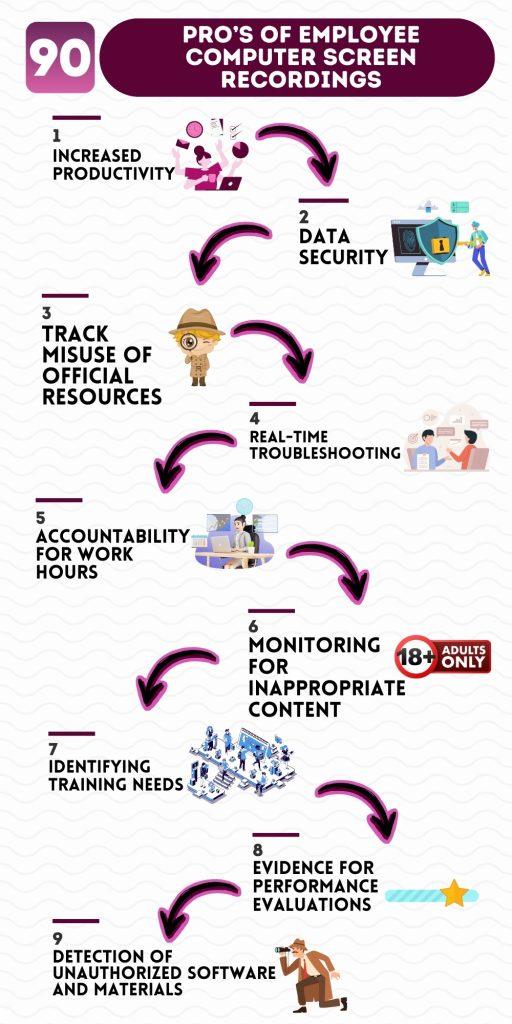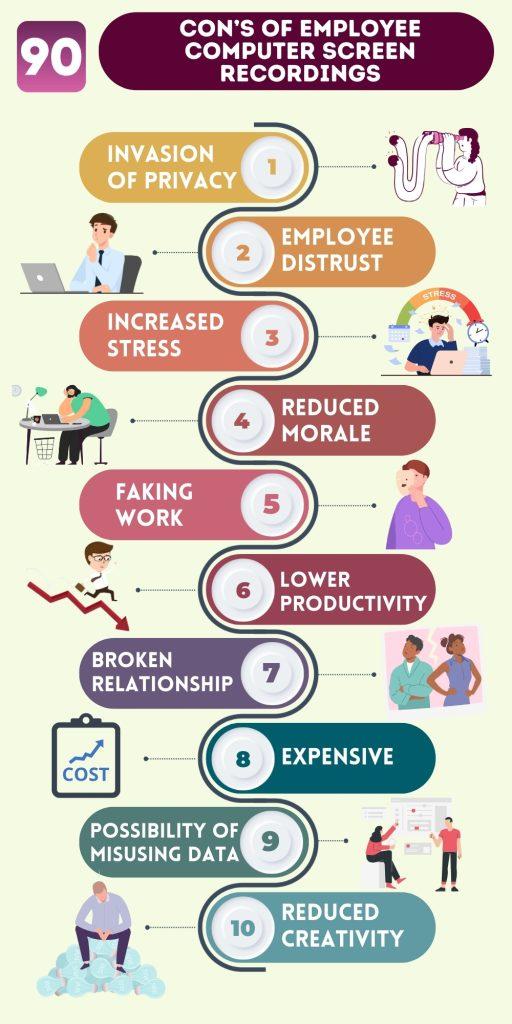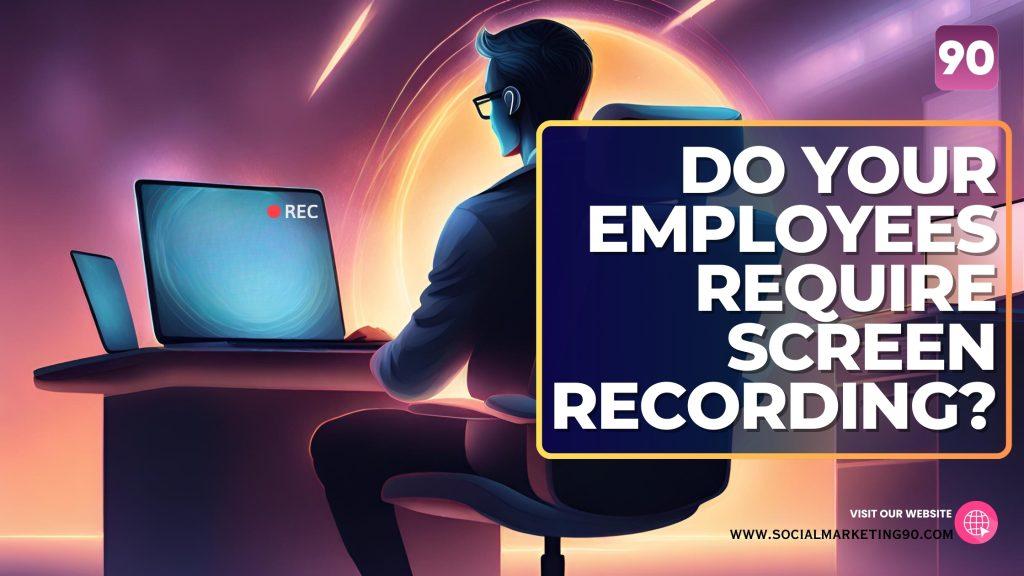Should you record your employee’s computer screen? If you’ve given your employee a work computer, you’re usually allowed to record what’s on their screen. But it gets tricky if they’re using their device for work, whether at the office or from home. In these situations, whether you can record their screen depends on the specific data protection laws in your area. Meanwhile, let’s examine the pros and cons of screen recording, and when it might be useful to do so.
Pros of Recording Your Employee's Computer Screen

Increased Productivity
VoucherCloud, a UK-based company, conducted research showing that UK workers over 18 are productive for an average of 2 hours and 53 minutes each day. These workers also spend over 4 hours on non-work activities like social media and chatting with friends during their workday.
In contrast, 62% of companies using employee monitoring apps have seen about a 7% increase in employee productivity. Such apps track employees’ activities during the workday through various means, including screen recording. This proves that if employees know their screen is being recorded, they tend to focus more on work during work hours, which can lead to better performance and output.
Enhanced Data Security
Employees sometimes share sensitive company information with outsiders, which can risk the company’s security and customer safety. In 2017, a Spiceworks study found that in 40% of companies, IT department workers noticed employees sharing sensitive data with third parties.
Recording your employee’s computer screen can help you spot when they share company information with external people. This allows you to quickly address these issues and prevent potential damage from data leaks.
Helps Track Misuse of Official Resources
Employees often use company resources to engage in non-work activities during office hours. For example, they might use the company’s WiFi to browse social media. Some might even use the company’s funds for their own online shopping. Then, they could bill the company for the time they wasted on these personal activities.
Luckily, by recording your employee’s computer screen, you can keep an eye on this. It lets you know exactly what they’re up to and when, helping you catch them if they try to cover up their misuse of company resources.
Real-time Troubleshooting
Employees can run into technical hiccups like trouble getting onto collaborative platforms, or accessing company servers, or their computers might crash or freeze. By continuously recording their computer screens, you can spot these issues as they happen. This means you can step in and help out right away, making sure that these issues don’t hold up their work or delay projects.
Accountability for Work Hours
Based on 2023 data from Zipdo, about 50% of employees think they’d put in more effort if they knew their bosses were watching. This might be because they want to justify how much time they spend on specific tasks.
Monitoring for Inappropriate Content
A survey by Sugarcookie found that 60% of employees watch adult content during work hours, and some even use their work computers for this. This behavior affects employers in two major ways.
Firstly, it greatly lowers the employee’s productivity because they get distracted from their work. Data from 2023 suggests that it takes about 23 minutes for a distracted employee to refocus. This means the employer ends up with an employee who isn’t fully engaged with their work.
Secondly, visiting inappropriate websites on work computers can risk the company’s data security. For example, a US Geological Survey employee visited over 9000 adult sites from his work computer, leading to a malware infection in the computer network.
Recording your employee’s computer screen could help prevent this. If employees know they’re being watched, they’re less likely to view inappropriate content during work or use their work computers for it. This approach helps keep your data secure and your business running smoothly.
Identifying Training Needs
Recording your employee’s computer screen lets you see which tasks they excel at and which ones they find challenging. This insight is valuable because it helps you identify the specific skills they need to improve. With this information, you can tailor your employee training sessions to focus on these areas, making the training more effective and relevant to their needs.
Evidence for Performance Evaluations
Why argue with your employees about how much work they’ve done during a performance review? They’re probably going to insist they worked non-stop. To avoid this kind of back-and-forth, you could record their computer screens during work hours. Then, when it’s time to look back at their performance over a specific period, like a week, you can just check the recordings. This way, you can assess their work based on real evidence and sidestep any unnecessary disputes.
Detection of Unauthorized Software and Materials
In this case, “unauthorized software” means software that an employee uses without having the proper license or permission. This includes unlicensed, pirated, or cracked software. A 2017 report by Spiceworks found that 50% of IT departments discovered employees using unlicensed software at work. Also, 30% found employees sharing copyrighted materials without permission over the company’s network.
By recording your employee’s computer screen, you can spot these unauthorized activities early on. Consequently, you’ll have the necessary information to take steps to stop them from happening again. You’ll also protect yourself and your business from legal issues that could arise from employees breaking intellectual property laws.
Cons of Recording Your Employee's Computer Screen

Invasion of Privacy
When an employee uses a work computer (one that you’ve provided), recording their screen typically doesn’t invade their privacy. This is because, legally, you’re allowed to record the screen of a work computer, whether you notify the employee beforehand or not. Also, employees are expected not to use work computers for personal matters. So, if you accidentally come across their personal information while recording, it’s not considered your fault.
However, if employees use their personal devices for work, you might inadvertently record their personal data like passwords, private messages, etc. This could be seen as invading their privacy.
To avoid this, you can let employees know you’ll record their screens during work hours and tell them they shouldn’t use work time for personal activities. Also, it’s good practice to get their consent before recording. They can refuse to let you record their computer screens, but you also have the right not to hire them if they refuse.
Employee Distrust
Even when you tell your employee upfront that you plan to record their computer screen, they might still feel like you don’t trust them to do their job without being watched. This could lead to them feeling that you don’t have their best interests at heart.
Increased Stress
The American Psychological Association has found that 32% of workers who are monitored through technology feel extra stress on the job. But it’s not just monitoring employees that makes them feel stressed. If you micromanage your team, controlling their every move and not showing them any appreciation, they’re going to feel like they’re just puppets. This kind of management, along with constant monitoring, really piles on the pressure and can make the workplace a stressful environment.
Reduced Morale
When you record your employees’ computer screens, they might feel like you don’t trust them to do their job properly on their own. This can be really discouraging. They might start to wonder why they should work as hard as they can if you don’t believe in them. As a result, they might even start working slower. They could figure that since you’re watching their screens all the time anyway, there’s no real point in trying to finish things quickly.
Faking Work
If you record your employees’ computer screens, they might start looking for ways to pretend they are working when they’re not. For example, they could use a mouse jiggling app, which moves the cursor around randomly to make it look like they are active on their computer.
There are even more sophisticated tools out there, like Lazy Work, which can create the illusion that they are browsing work-related websites, typing, or scrolling, even though they’re not actually doing any work. Essentially, these tools help them create a false appearance of productivity to meet the expectations of the screen recording.
Lower Productivity
The interesting thing about recording your employee’s computer screen is that it might do more harm than good. A study published in 2021 showed this quite clearly. It found that when employees know they’re being watched, they might not stick to the rules as closely and could end up doing a sloppy job.
But instead of worrying about their work quality going down, these employees often blamed their boss. They think, “If I wasn’t being watched all the time, I would have done a better job.” So, ironically, instead of making them work better, the monitoring ends up giving them a reason to not put in their best effort.
Damaged Relationship with Your Employee
Keep in mind that if you record your employee’s computer screen, you might come across things that you really don’t like. This could lead to tough decisions, like having to fire someone, which definitely ruins the good relationship you once had.
There’s also a legal side to consider, especially if your employee uses their personal computer for work. If you record their screen without asking them first, they might feel their privacy has been invaded and could even take legal action against you for that.
Recording Your Employee’s Computer Screen Is Expensive
When you decide to record your employee’s computer screen, you’ll spend time and money. First, there’s the expense of installing the monitoring software itself. This isn’t free and requires an investment. Then, if you decide to have someone else monitor these recordings – say, an additional employee or a third-party service – you have to pay them, which adds to your costs.
Alternatively, if you choose to do the monitoring yourself, it means dedicating your own time to this task. This is time that could have been spent on other important aspects of your business. So, whether it’s money or time, screen recording your employees comes with a cost.
Potential for Misuse of Recorded Data
There’s always a chance that recordings of your employee’s computer screen could be used in ways that harm them. It doesn’t matter if they’re using a computer provided by the company or their own personal one.
Take what happened at Google in 2019 as an example. Some of the employees there claimed that Google was planning to roll out a new app that was supposed to be a calendar app, but it actually had a hidden purpose. The app was reportedly designed to alert Google’s executives whenever an employee set up a big meeting with over 100 people.
Why? The company wanted to keep an eye on these large gatherings to possibly prevent employees from banding together and rebelling against work policies that they disliked. This story shows how seemingly innocent employee monitoring apps can be used in ways that aren’t in the best interest of the employees.
Reduced Creativity
In many businesses or organizations, there are established standard operating procedures and rules that employees are expected to follow when performing their tasks. Sometimes, employees might find shortcuts to save time, even if it means bending or skipping a rule here and there.
However, when employees are aware that their computer screens are being recorded, they tend to become more meticulous about following every rule to the letter. While this may seem like a good thing in terms of compliance, it can also stifle creativity and innovation in how employees approach their tasks. The fear of being monitored can discourage them from thinking outside the box and finding more efficient or innovative ways to accomplish their work.
When Is It a Good Idea to Record Your Employee's Computer Screen? - The Wrap up

Before you decide to record your employee’s computer screen, here’s what you should do:
- Evaluate the pros and cons of recording your employee’s computer screen. Make sure the advantages are bigger than the disadvantages.
- Check if recording your employee’s computer screen is permitted by data protection laws in your region.
If, after taking these steps, you still think recording your employee’s computer screen is a good plan, then you can do it.
Generally, it’s a good idea to incorporate recording your employee’s computer screen into their employment contract before hiring them. Insert a clause in the contract allowing you to record their computer screen during work hours, regardless of whether they use a work or personal computer. Draw their attention to this clause before they sign the contract, so you can be sure that they provide informed consent to the screen recording.
If you’ve already hired the employee, inform them in advance that you’ll be recording their computer screen. Clearly explain the recording process, how it will be done, and the purpose of using the recorded data. These actions are essential to protect yourself from potential data privacy claims by the employee.
Finally, consider consulting with a lawyer to understand the full legal implications of recording your employee’s computer screen and how to go about it.







